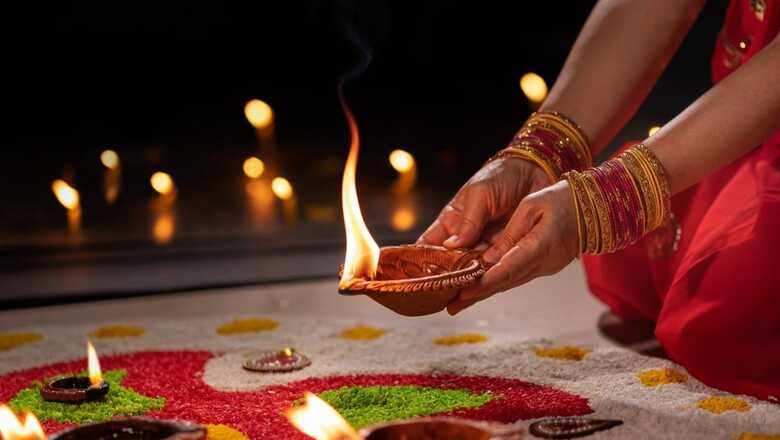
views
DIWALI 2023: Deepawali, also known as Diwali, is one of the important festivals in Indian culture. This celebration commemorates the victory of good over evil and light over darkness. Diwali is celebrated not only in India but also throughout southern Asia and other parts of the world for a number of reasons. Diwali is observed on the darkest night of the lunar month of Kartika, which usually occurs in October or November.
Diwali will be celebrated on November 12 this year. Diwali preparations begin months in advance, and Goddess Lakshmi and Lord Ganesha are honoured on the festival day. During Diwali puja, cleanliness is very important, encouraging people to start cleaning their houses several days in preparation. Devotees light candles in their houses and enjoy exquisite food after the puja.
Deepawali, which coincides with the Hindu New Year, celebrates fresh beginnings and symbolises the triumph of light over darkness. The festival of lights is observed by adorning homes with candles and lamps, conducting religious ceremonies, sharing gifts and wishes, as well as bursting firecrackers.
Diwali: History And Origin
Diwali may be traced back to ancient India. It is most likely a light celebration that originated as an important harvest festival about 2,500 years ago. However, different tales surround the origin of Diwali. Many of these tales include the triumph of virtue over evil.
Tale of the Ramayana
The most well-known Diwali narrative is about Lord Rama’s return to Ayodhya after 14 years in exile and defeat of the demon king Ravana. During this exile, the evil king Ravana of Lanka kidnapped Sita. Lord Rama eventually defeated the Lanka King and saved Sita after many obstacles. In joyful celebration of this triumph and the homecoming of King Rama, the people of Ayodhya rejoiced by lighting the kingdom with earthen diyas, distributing sweets, and blowing off firecrackers, a practice that is still followed by people who commemorate the festival.
Goddess Kali’s Story
In some regions of India, particularly in West Bengal, Diwali is dedicated to the worship of Maa Kali and is celebrated with great zeal. It is stated that Goddess Kali was born to save the world from the demons. After destroying the demons, Goddess Kali lost control of her rage and began slaughtering everyone who came her way. Lord Shiva had to intervene to halt her murderous frenzy. This is the exact moment she treads on Lord Shiva with her scarlet tongue out, eventually stopping her aggressive activities in terror and sorrow.
Tale of Goddess Lakshmi
On Diwali, people worship Goddess Lakshmi, who is revered as a goddess of prosperity and wealth. This deity’s birthday is celebrated on the New Moon day of the Karthik month. Lord Vishnu was so taken with Lakshmi’s peaceful nature that he chose to marry her, and so the diyas were lit in a row to commemorate the event. Since then, Deepawali has been observed to honour Goddess Lakshmi and seek her favours.
Diwali and its significance
Every Diwali celebration ritual has a meaning and a tale behind it. The festival represents the spiritual triumph of light over darkness, good over evil and wisdom over ignorance. The lights of Diwali represent a time to remove all of our negative ambitions and ideas, to erase dark shadows and evils, and to give us the power to continue our kindness for the remainder of the year.


















Comments
0 comment